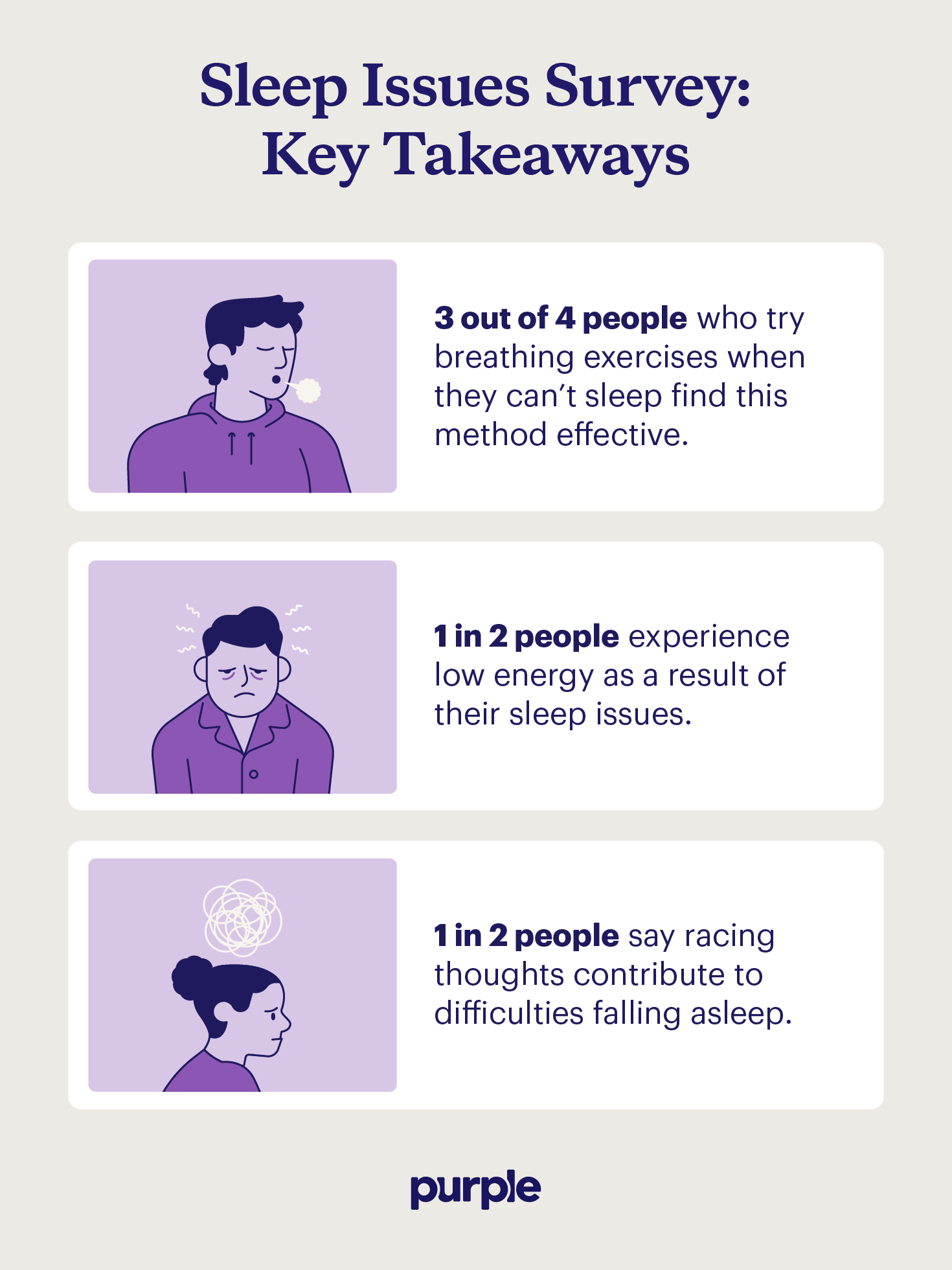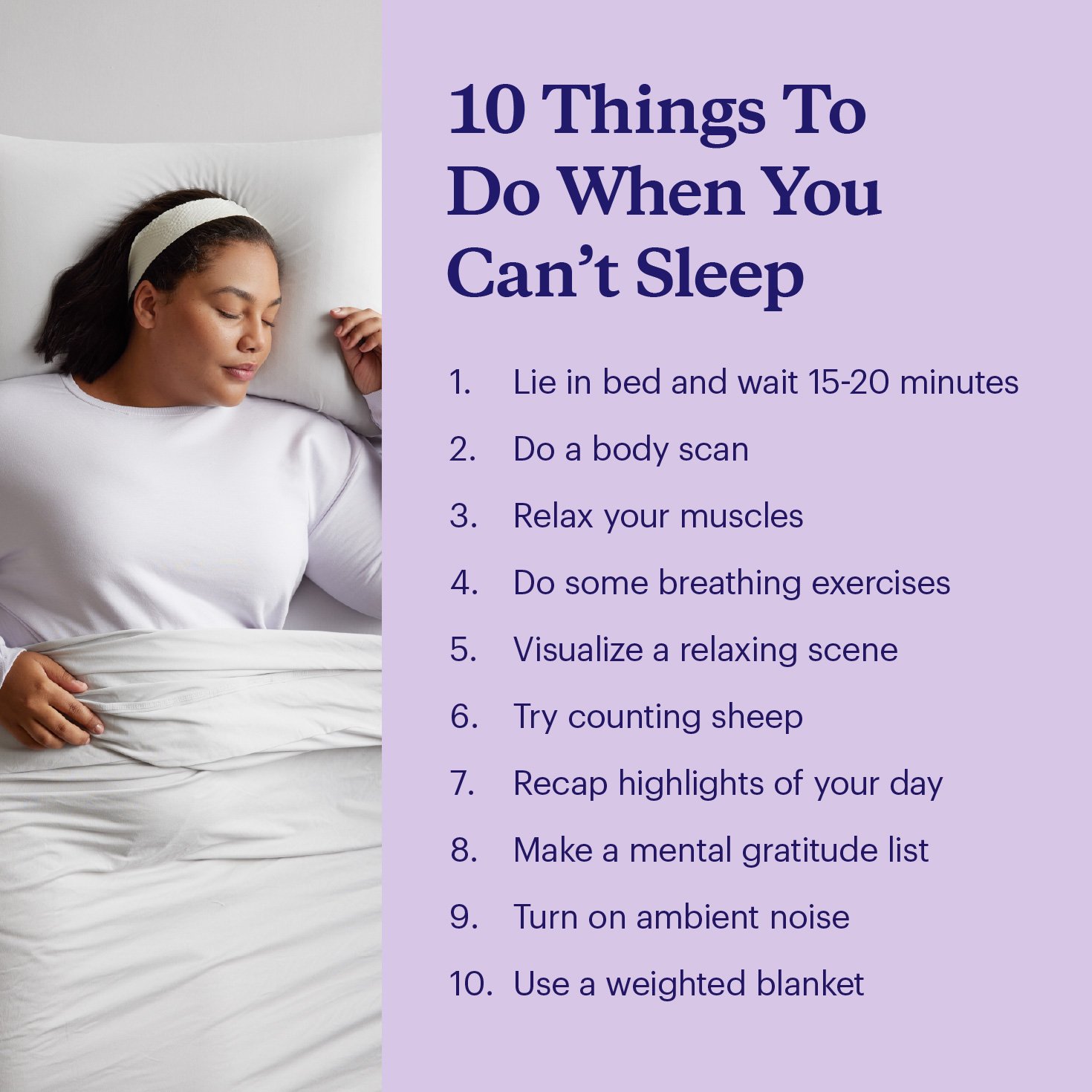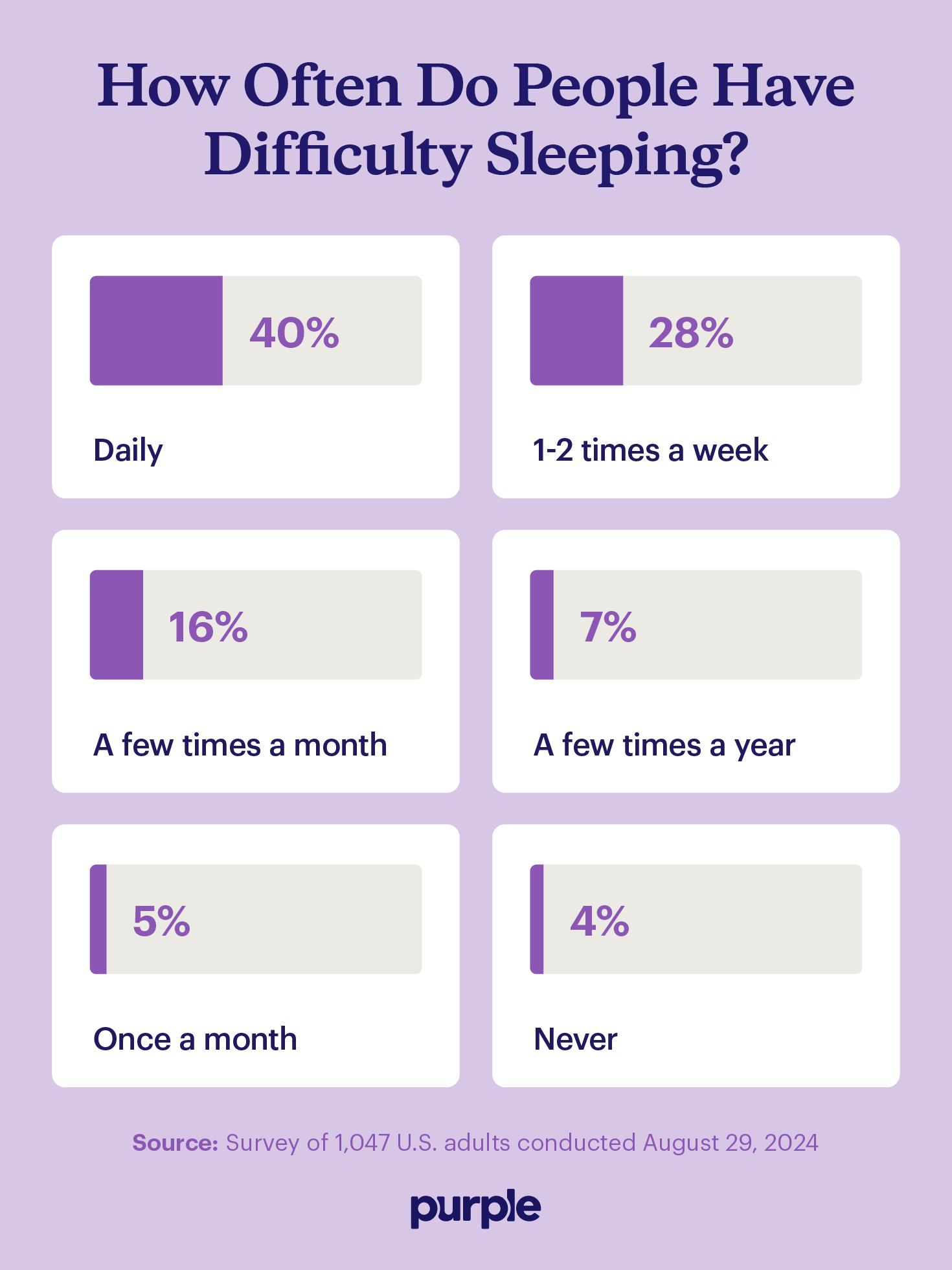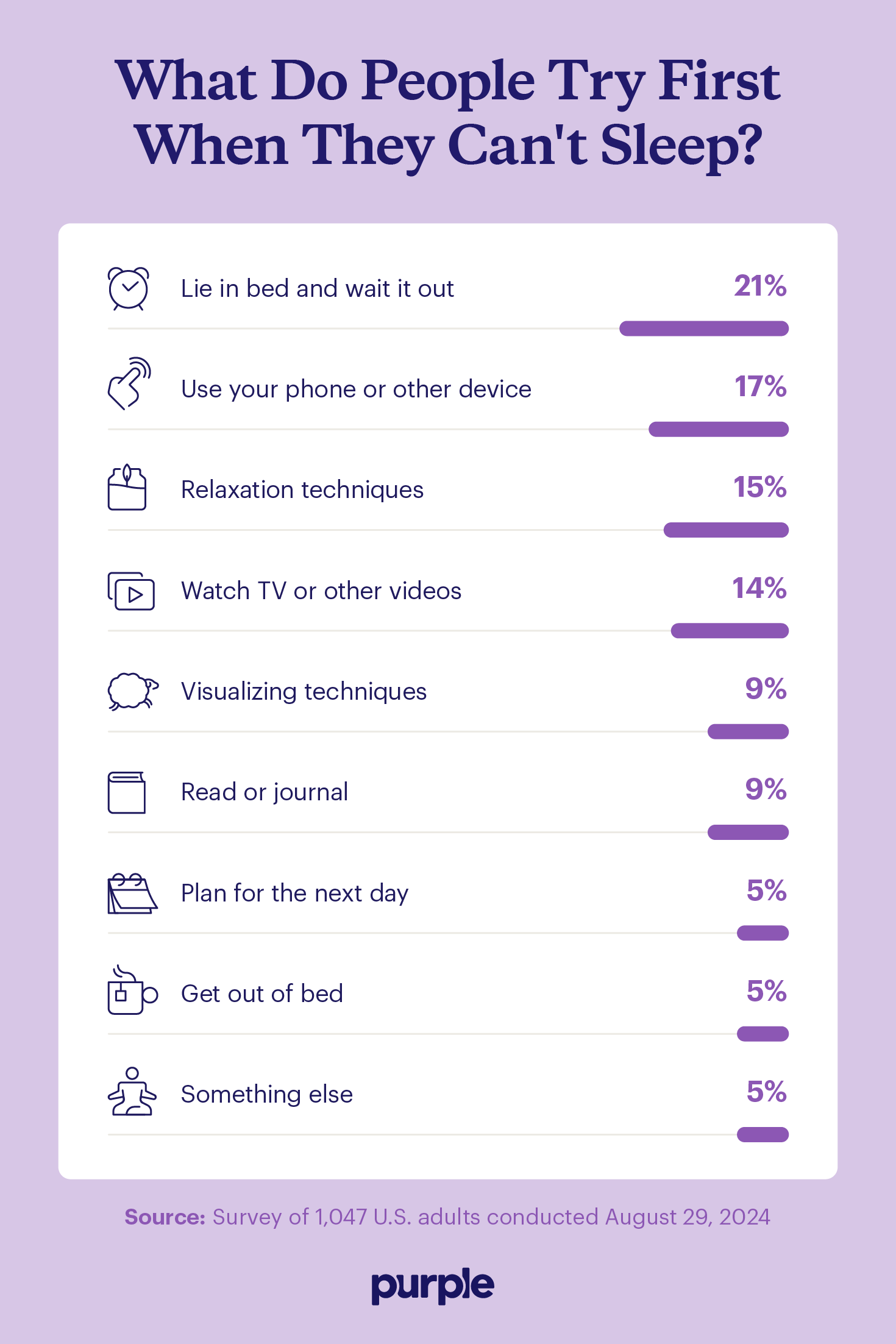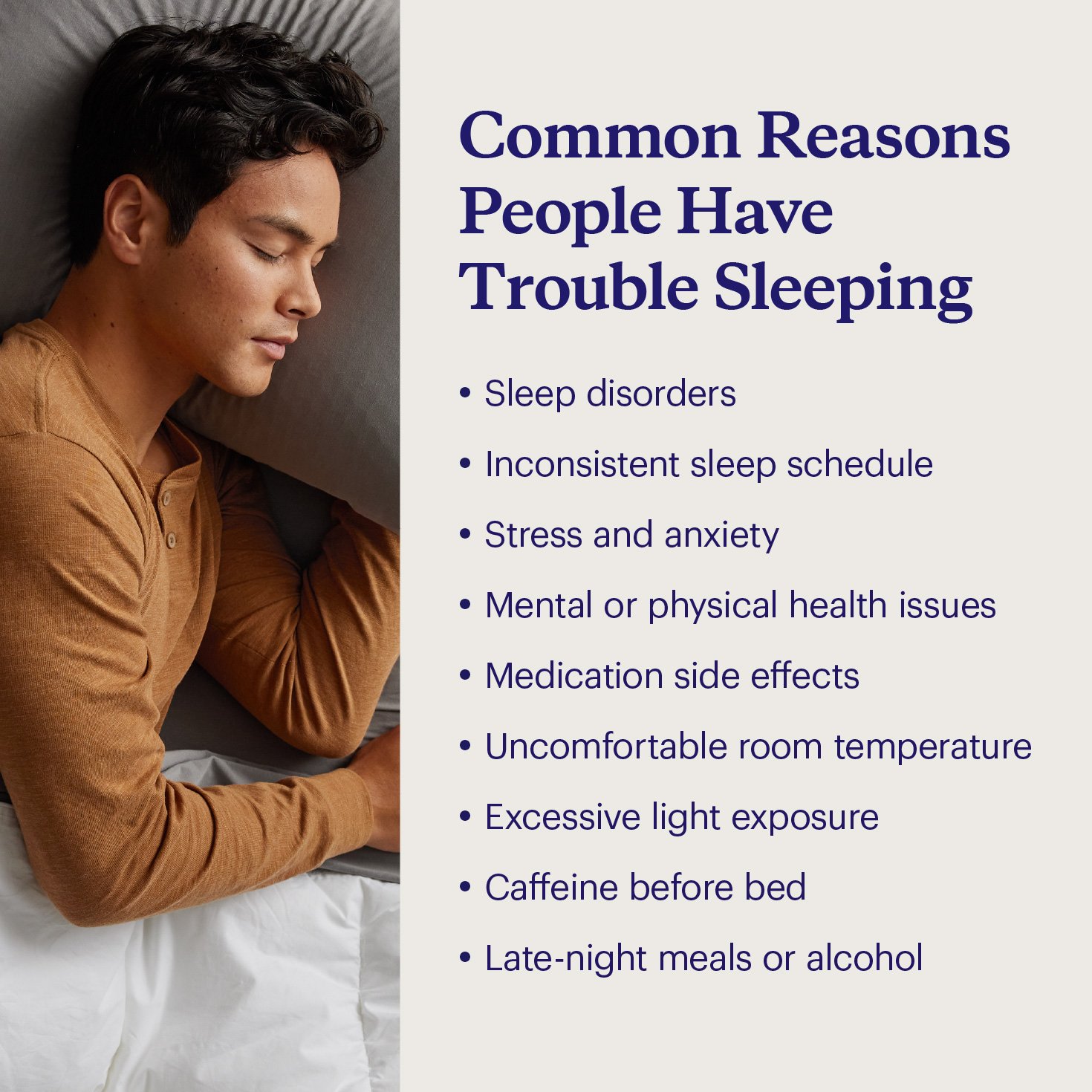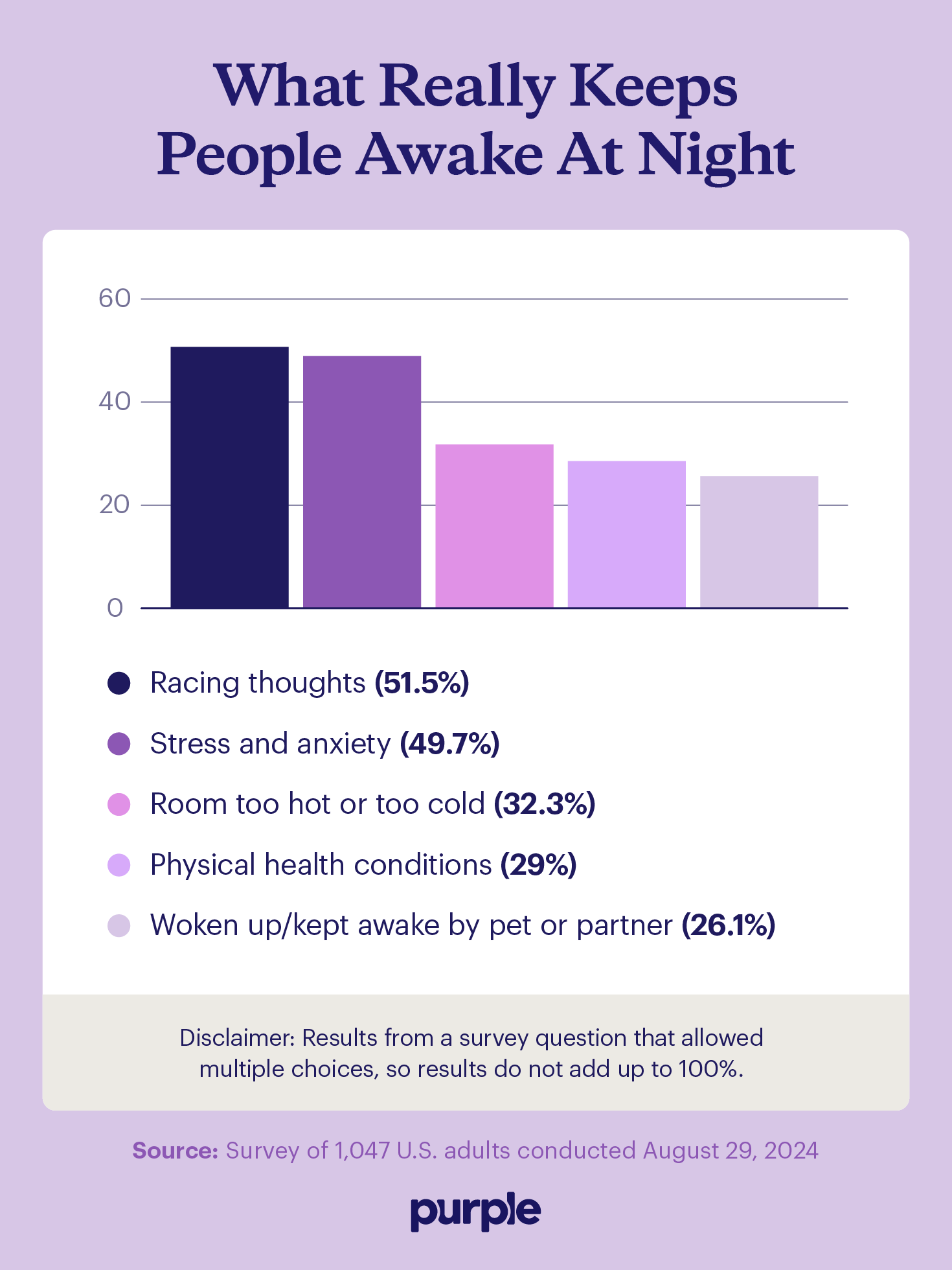
20% of People Swear You Should Do This When You Can't Sleep [+ 35 Tips]
Key Takeaways
- Over 80% of sleepers have a hard time falling or staying asleep more than once a month.
- When they can’t sleep, 21% of people opt to simply lie in bed and wait, an effective strategy for 50% of them.
- Relaxation techniques like breathing exercises and meditation may be some of the most effective ways to help yourself fall asleep.
- At least 50% of people report racing thoughts and stress or anxiety as top reasons why they have trouble sleeping.
When you’re lying awake because you don’t know what to do when you can’t sleep, the best thing may simply be waiting it out, according to 20% of respondents in our recent survey. For anyone who can’t get comfortable in bed, struggles with racing thoughts, or is kept awake by factors beyond their control, don’t worry — restful slumber is within reach.
We surveyed over 1,000 U.S. adults to dig deeper into how often people have trouble sleeping and what practices help them fall asleep. The results suggest that sleep issues are widespread, but having a consistent sleep schedule and helping yourself relax at night can mitigate some of these problems.
88% Struggle With Not Being Able To Fall Asleep
From our survey, 88% of people have difficulties falling asleep at least once a month, and 2 out of 3 people report having sleep issues at least once a week. Nearly 40% of people report having difficulties falling or staying asleep every day, making sleeplessness an extremely common issue.
The impact of having trouble sleeping can be significant, resulting in low energy, stress, and sleepiness. Whether you’re trying to figure out why you can’t sleep or what to do when you can't sleep and are bored, digging into your sleep issues can shed light on what you should try first.
Our methodology: We surveyed 1,047 U.S. adults over the age of 18 via SurveyMonkey on August 29, 2024. This data is unweighted, and the margin of error is approximately +/-3% for the overall sample with a 95% confidence level.
More Than 40% of People Would Give Up Caffeine To Sleep Better
More than 40% of respondents to our survey would be willing to give up caffeine if it meant they wouldn’t have sleep issues, and 39% of respondents would consider cutting out alcohol for the same result.
In an ideal world, falling asleep would be easy no matter what, but most people seem to have trouble sleeping fairly often. For anyone who’s ever stared at the ceiling, willing yourself to go to sleep, try the tips below to help yourself relax and rest more soundly.
1 in 2 People Report Low Energy As a Result of Sleep Issues
Sleep disruptions can cause several short-term and long-term side effects, ranging from sleepiness, mood swings, and cognitive issues to an increased risk of hypertension and cardiovascular disease.1
Over 50% of surveyed individuals indicated that their sleep issues result in low energy, making it the most common side effect. Similarly, excessive daytime sleepiness is common, with nearly 40% of survey participants reporting higher levels of grogginess when they can’t sleep the night before.
When you can’t sleep, you may worry about impaired performance at work, memory issues, or irritability that puts strain on your relationships. Stress or anxiety is the second-most common side effect of sleep disruptions, with 44% of sleepers reporting they experience these symptoms.
Relaxation Techniques Help 74% of People Fall Asleep
When you can’t sleep, you may be willing to try anything if it helps you get the rest you need. But you may also gravitate towards whatever feels easiest, like grabbing your phone, even if it doesn’t help you relax.
Relaxation techniques such as breathing exercises, meditation, or mindfulness may be the most effective practice, with 74% of those who use it reporting it as effective or very effective. What works for some people may not work for others, but relaxing practices like mindfulness may be helpful in improving sleep quality and reducing sleep disturbances.2
35 Things To Try When You Can’t Fall Asleep
From mindful breathing techniques to consciously letting go of the day’s events, there are plenty of things you can try to help yourself fall asleep fast.
When rest seems out of reach, and you don’t know what to do when you can't fall asleep, explore the following methods to relax, calm your mind, and get the sleep you need.
1. Be Patient
On average, it takes about 20 minutes for an adult to fall asleep after lying down. This number varies from person to person, and when it takes longer than you’d like, it can cause frustration and anxiety.
More than 1 in 5 survey respondents report that they first try lying in bed and waiting when they can’t sleep, and exactly half of them rate this method as somewhat or very effective.
If you're struggling to fall asleep, try to stay patient so that your stress levels don’t start to rise. Allow yourself time to relax, and try to let sleep come naturally.
2. Do a Body Scan
A mental body scan is a kind of meditative practice that allows you to assess how your body feels, identify sensations, and release tension to help you relax.
Start by sitting or lying down in bed. Close your eyes and mentally scan your body, focusing on each muscle group, starting with your toes and ending with your head. As you move through your body, pay attention to any areas that feel particularly tense or rigid and consciously release any tension you encounter, letting go of stress with each breath.
3. Relax Your Muscles
Progressive muscle relaxation (PMR) is another way to relax your body to encourage sleep. This technique focuses on deliberately tensing and relaxing different muscles to help you address lingering tension.
You can start by clenching your fists and slowly relaxing them as you exhale. Repeat for other muscles to relieve tension and help yourself relax.
4. Practice Controlled Breathing
Controlled breathing techniques can be powerful tools to help you relax and fall asleep. Experiment with different methods to find what works best for you. One exercise is the 4-7-8 technique, which helps keep your breathing even and promotes relaxation.3 This pattern can help regulate your breathing, reduce stress, and calm the mind. In practice, this method entails three easy steps:
- Inhale: Breathe in through your nose for four seconds.
- Hold: Keep the air in your lungs for seven seconds.
- Exhale: Let the air out through your mouth for eight seconds.
You can also try diaphragmatic breathing, where you place one hand on your abdomen and the other on your chest.4 Slowly breathe in through your nose, expanding your abdomen as you fill your lungs with air. Your chest should move very little. Exhale slowly, feeling a gentle contraction of your abdomen. Focus on the rhythm of your breath and the sensation of your hands rising and falling.
5. Visualize a Peaceful Scene
When you focus on a serene and positive memory or imaginary scene, you can immerse yourself in the pleasant details, sights, sounds, and feelings it triggers. By mentally reliving positive experiences or visualizing something calm, your mind drifts away from any current stress or racing thoughts, allowing you to gradually wind down. This mental diversion gently tires the mind and sets the stage for a more peaceful and uninterrupted night's rest.
6. Count Sheep
Yes, really. Counting sheep to fall asleep is one of the more well-known sleep techniques, but you’ve got to do it right. To begin, it may help to imagine a serene pasture with a fence and fluffy sheep. As you lay in bed, envision each sheep jumping over the fence, and with every count, visualize the details — their wooly coats, graceful leaps, and the rhythmic pattern of their movement.
The simple, monotonous nature of counting sheep, or any other animal, can distract your mind from racing thoughts and anxieties and help lull your brain into a tranquil state.
7. Recap the Positives of Your Day
Recounting the positives of your day before bedtime can be a powerful way to let go of anxiety and fall asleep. As you reflect on positive moments, achievements, and joyful experiences, your mind shifts away from stressful or anxious thoughts, cultivating gratitude and contentment while promoting a more peaceful and optimistic mindset.
8. Make a Mental Gratitude List
Creating a mental gratitude list is another way to shift your focus towards positivity. Acknowledge the positivity in your life and let it fill your heart and mind, promoting a sense of peace and contentment.
Start by reflecting on the things you are grateful for in your life, big or small, such as:
- Your friends and family
- Your good health
- An upcoming vacation
9. Turn on Ambient Noise
Some people find that the slightest sounds can disturb their sleep. Ambient noise can drown out these disturbances and quiet your internal thoughts. These rhythmic and predictable sounds can also diminish the chatter of racing thoughts, creating a calm environment and allowing your mind to release anxious or intrusive thoughts.
Test out these common sources of ambient noise to see which works best for you:
- White noise
- Pink noise
- Brown noise
- Soft music
- Nature sounds
10. Use a Weighted Blanket
Deep Touch Pressure (DTP) is a stimulation technique that involves applying gentle pressure to the body to trigger the release of serotonin and dopamine and promote relaxation.
Weighted blankets and weighted eye masks can provide comforting pressure, which stimulates sensory receptors, induces a feeling of security, and reduces anxiety so you can fall asleep more easily.5 You can also try a grounding sheet, though your results may vary.
11. Get Out of Bed
If you've spent a considerable amount of time in bed trying to fall asleep and haven’t made progress, try getting out of bed and engaging in a calming, nonstimulating, or “boring” activity.
Engaging in a monotonous or mindless activity can help ease anxiety and racing thoughts. Whether it's organizing a drawer, doing laundry, or cleaning, the objective is to distract your mind from the stress of not falling asleep and allow yourself to become naturally tired. Once you start feeling drowsy, you can return to bed and try to sleep again.
12. Lay Down in a Different Room
A change in environment can give your mind and body the peace you need to fall asleep. Laying down to sleep in a different room can be a game-changer, especially if you're dealing with distractions. A separate room can offer solitude, minimizing disturbances like a snoring partner or restless pet that might interfere with your ability to fall asleep.
It may also help to lie down briefly in another room to mix things up. When you can't sleep, try lying on the couch or even the floor; telling your body that it’s time for bed, no matter where you are, can make it easier to fall asleep once you lay back down.
13. Prepare Your Body for Sleep
Establishing a relaxing bedtime routine can calm your body and mind to help you sleep better. A few ways you can prepare your body for rest include:
- Take a warm bath or shower: This can be a soothing way to relax your muscles and promote a sense of tranquility.
- Get comfortable: Put on comfy clothes or pajamas before crawling into bed.
- Stay hydrated: Keep a glass or bottle of water by your bedside.
- Avoid heavy meals: Try not to eat too much within a couple of hours of bedtime to prevent discomfort or indigestion during the night. Instead, opt for a light, balanced snack if needed.
14. Practice Meditation and Mindfulness
Meditation is a popular method for clearing your mind of distractions, calming your mood, and helping you fall asleep.6 Start by finding a quiet and comfortable space (like your bed), then close your eyes and focus on your breath. Inhale and exhale deeply, while paying attention to each breath. If thoughts emerge, recognize them and guide your attention back to your breathing.
You can also use guided meditation apps or recordings designed for relaxation and sleep. These exercises help calm the mind, reduce anxiety, and promote inner peace, allowing you to let go of the day's worries and drift into a restful slumber.
15. Air Out Your Daily Stressors
Sharing your concerns and worries aloud can lighten your emotional load, providing a sense of relief and validation. In therapy, a trained professional can guide you through coping strategies and offer valuable insights to manage stress effectively.
Confiding in a trusted friend can provide you with emotional support, empathy, and fresh perspectives. Both avenues allow you to release pent-up tension and reduce anxiety.
16. Read or Journal
Reading or journaling before bedtime can be a pleasant way to wind down. Reading a book helps divert your mind from daily stresses, and journaling allows you to jot down your thoughts, worries, or reflections from the day, acting as a form of mental decluttering that promotes a sense of closure and tranquility.
17. Write a Letter
Composing a heartfelt letter to yourself or expressing gratitude to someone else before bedtime can give you a sense of emotional ease and peace. Writing down reasons for self-appreciation or expressing gratitude towards others can encourage a more optimistic perspective, shifting your focus away from negative or stressful thoughts that might hinder sleep.
18. Jot Down Tomorrow’s To-Do List
When thinking about your responsibilities keeps you up at night, jotting them down on paper helps externalize those thoughts and put things into perspective. By organizing your tasks and planning for the next day, you can reassure yourself that you won’t forget to do anything. This structured approach instills a sense of control and order, allowing you to mentally prepare for the following day.
19. Drink Chamomile Tea or Warm Milk
Drinking chamomile tea or warm milk before bedtime can be an effective way to help you relax. The soothing nature of a warm beverage can create a sense of calm, easing the transition into a restful night's sleep, and around 1 out of 4 people have tried drinking tea at bedtime to help them relax when they can’t sleep.
Chamomile tea contains compounds like apigenin that have mild sedative properties.7 Similarly, warm milk contains tryptophan, an amino acid that supports the production of serotonin and melatonin. A warm drink can also signal to your brain that it's time to wind down. If chamomile isn’t your preferred cup of tea, you can test the effectiveness of other foods that may help you sleep better.
20. Try Bed Yoga
Research has shown that doing light exercise, like stretching or yoga, can promote muscle relaxation so you fall asleep more quickly.8 Try experimenting with these exercises on a flat surface before getting into bed:
- Child's pose: Kneel on the floor with your butt resting on your heels. Stretch your arms forward and place your forehead on the floor.
- Cat-cow: Get on your hands and knees. Inhale and tilt your pelvis so that your tailbone sticks up. Look up and bend your lower back so it’s concave. Exhale as you arch your spine, tilt your pelvis down, and look down.
- Legs-up-the-wall: Lie down on the floor with your butt against the wall. Straighten your legs against the wall and rest your arms on the floor.
You can also try these stretches while lying in bed to help increase blood circulation, alleviate muscle tightness, and encourage deep breathing:
- Sleeping butterfly: Lie on your back with your knees bent. Slowly bring the bottoms of your feet together as your knees lower to either side of your body.
- Half-saddle: Sit on the heel of one leg with the other leg extended. Slowly lean back until you’re lying on the bed. Repeat with the other leg.
- Corpse pose: Lie down with your legs shoulder-width apart. Place the palms of your hands upward and separate from your torso. Relax your body.
21. Take Melatonin
Melatonin is a naturally-occurring hormone in your body that helps you feel tired. When your circadian rhythm is disrupted by excessive light exposure, unconventional waking hours, or other factors, your body may not produce enough melatonin to make you fall asleep.
Over-the-counter melatonin supplements may be beneficial if you don’t feel tired when you want to go to bed. More than 1 in 3 sleepers have tried melatonin or other supplements to help them sleep, but effectiveness may vary.
22. Perfect Your Sleep Environment
Perfect your sleep environment by maximizing its level of coziness and investing in bedroom features that enhance your sleep. Some go-to items to add to your sleep sanctuary include:
- Lighting: Opt for soft, warm lights instead of harsh, bright lighting in your bedroom, especially at night.
- Curtains: Blackout curtains can block out street lights or early morning sunlight to keep your bedroom cool and dark.
- Pillows: Choosing the best pillow for your preferred sleeping position can better support your head and neck to prevent discomfort.
- Bedding: High-quality bedding encourages optimal physical comfort.
- Mattress: A supportive mattress that fits your sleeping position and body type can make a major difference in your sleep quality.
- Bed base: Having the right base for your mattress can reduce premature sagging and ensure you get the support you need.
- Other bedroom accessories: Try a humidifier to prevent dryness or an essential oils diffuser to fill the room with a soothing scent.
Each of these components can help improve your overall sleep quality to ensure you wake up refreshed and rejuvenated. If you’re unsatisfied with your current bed base, consider an adjustable base to customize your sleep experience with more relaxation and comfort.
23. Adjust Your Thermostat
The best sleep temperature for most tends to fall between 60 to 67 degrees Fahrenheit, though this may vary from person to person. Sleeping in a room that is too hot or too cold can make it harder for you to fall and stay asleep, and it may even reduce REM sleep.9 Lower the thermostat to your preferred sleeping temperature, but keep a blanket on hand in case you get chilly.
24. Change Your Sheets
Switching to fresh, crisp sheets creates an inviting and comforting environment that can impact your overall sleep experience. Slipping into clean bedding can be both physically and psychologically rewarding, signaling the end of the day and the beginning of a restful night's sleep.
On the other hand, dirty, unkempt, or old sheets can cause discomfort and disrupt your ability to relax. Accumulated sweat, oils, and debris on unwashed sheets can lead to an unclean feeling and potential skin irritation, making it difficult to settle down and get comfortable. Depending on the material, weave, and quality, sheets may last one to two years on average, but some sheets can last longer without becoming damaged or uncomfortable.
If a laundry cycle isn’t enough to improve your old, rough sheets, consider replacing your sheets with a set of silky-smooth Purple SoftStretch® sheets for added comfort.
25. Dim Your Lights
Bright lights can inhibit your body’s production of melatonin. By gradually reducing the intensity of light in your surroundings, your body receives the signal that it's time to wind down.
Going from bright light to darkness can hinder this process, meaning you may not feel tired when you lie down. Dimmer lighting mimics the natural progression from daylight to darkness, prompting your brain to produce melatonin and induce drowsiness.
26. Put Away Your Devices
Over 16% of respondents opt to use their phones or other devices when they can’t sleep, and just over half of them claim this practice is at least somewhat effective in helping them fall asleep. But, late-night browsing may delay sleep and cause low daytime energy. Phones and other devices produce blue light, which can keep you awake by inhibiting the body’s natural melatonin.
Try placing your devices on the other side of the room before bed to further reduce the temptation of endless scrolling, and if you plan to use tech in bed, turn on the blue-light reduction mode.
27. Save Your Bedroom for Sleep
By maintaining your bedroom as a dedicated sleep environment, you condition your brain to associate it with rest and relaxation. Eliminating distractions like TV and games helps establish a mental boundary, ensuring that your mind knows it's time for sleep when you enter the bedroom.
28. Stick to a Sleep Schedule
59% of people claim to have a consistent sleep schedule and get at least 6 hours of sleep each night. Nearly 75% of these sleepers reported good or excellent sleep quality. Of these sleepers, those who get 8+ hours seem to have the highest overall sleep quality, with 9 out of 10 sleepers reporting good or excellent sleep.
Following a regular sleep schedule by making a point to wake up and prepare for sleep at consistent times can reset your body clock and gradually train it to feel sleepier or more awake at certain times.
29. Start Your Bedtime Routine Early
If you’ve had a hectic day, your adrenaline could be running at higher-than-normal levels later in the night. Starting your bedtime routine earlier in the evening can signal to your body that it’s time to ramp down your energy.
When your body experiences your established sleep triggers (such as dimming the lights, putting on PJs, brushing your teeth, or having a cup of tea), it’s more likely to deliver your desired responses. Consistently maintaining your bedtime routine can help you fix your sleep schedule and allow you to get better quality sleep.
30. Avoid Late Afternoon Naps
A midday nap on occasion may be just what you need to feel refreshed and energetic, but napping too frequently and for too long may disrupt your circadian rhythm and make it more difficult to fall asleep when you go to bed.
If you feel like taking a nap, try to set an alarm for just 10 minutes. Studies suggest that a 10-minute nap may be ideal, with improved cognition and minimal grogginess compared to longer (or shorter) nap durations.10,11
31. Exercise Regularly
Engaging in vigorous exercise in the morning or early afternoon may help you fall asleep later. Physical exertion increases the release of endorphins, which can boost your mood and relieve stress. This burst of endorphins, combined with the fatigue from a rigorous workout, can help regulate your body's internal clock and enhance your overall sleep quality.
Intense workouts can effectively tire you out, but too much physical activity right before bed can also stimulate your body, raise your temperature, release adrenaline, and boost alertness. This can delay the natural wind-down process that your body needs to prepare for sleep.
32. Get Natural Light and Fresh Air Daily
Spending some time outside exposes you to natural light, which can help normalize your circadian rhythm and help you fall asleep at night. Getting fresh air can also reduce daily stress levels, making it easier for you to relax when you lie down.12
33. Be Mindful of Your Diet
While avoiding heavy meals before bed is ideal, that doesn’t mean you should go to bed hungry. Try eating a heavier lunch instead, then enjoy a light dinner, or plan to have an earlier dinner if you prefer a larger meal in the evening.
34. Limit Caffeine and Alcohol
The caffeine from that first cup of coffee can stay in your system for over nine hours.13 If you use caffeine to get you through your afternoon slump, it can keep you energized long after you want it to.
For many people, alcohol can prevent you from falling asleep or make you wake up throughout the night, reducing sleep quality. Of those who responded to our survey, 1 in 5 have tried alcohol when they can’t sleep; alcohol may temporarily induce relaxation and sleepiness, but alcohol consumption may impact overall the quality and duration of your sleep, as well as how often you wake up during the night.14
Try to limit your caffeine consumption strictly to morning hours so it won’t keep you awake. Avoiding alcohol may also help improve your sleep quality so you can sleep through the night.
35. Talk to a Specialist
If you try all of the sleep techniques outlined in this post and you still have difficulty falling asleep, it might be time to consult a specialist. Sleep specialists, such as sleep doctors or psychologists, can diagnose and treat sleep disorders or chronic sleep issues. They can conduct comprehensive evaluations like sleep studies to pinpoint the root cause of your sleep problems.
Through a specialized assessment, they can develop tailored treatment plans to address your unique needs. These professionals can guide you with appropriate interventions, ranging from behavioral adjustments and cognitive therapies to medical treatments.
9 Possible Reasons You Can’t Sleep
Factors that affect your sleep can vary, and even if you consider well-known sleep facts, your experience may be completely unique depending on your diet, sleep environment, and daily activities.
If you’re having trouble sleeping and are looking for a reason why, consider nine of the most common reasons why people can’t sleep so you can make changes to your routine and take any necessary steps to improve your sleep quality.
Sleep Disorders
The most common cause of restless sleep disorder is insomnia, with repeated difficulty falling or staying asleep. Individuals with insomnia often face significant distress and functional impairment during the day.
Common symptoms of insomnia include:
- Trouble falling asleep at bedtime
- Frequent awakenings throughout the night
- Waking up too early and being unable to return to sleep
- Feeling unrefreshed upon waking
- Experiencing daytime fatigue or irritability
Other common sleep disorders include:
- Narcolepsy: Excessive sleepiness and difficulty regulating when you sleep
- Sleep apnea: Chronic snoring and disrupted breathing patterns
- Restless legs syndrome: Compulsion to move legs or other parts of the body when falling asleep
Consult a healthcare professional if symptoms of insomnia or other sleep disorders persist, as early intervention and appropriate management are crucial for improving your sleep and well-being.
Inconsistent Sleep Schedule
The body’s circadian rhythm is the natural internal clock that regulates the sleep-wake cycle. When you wake up at inconsistent times, this internal clock is thrown off balance, making it challenging for your body to establish a stable and predictable routine.
This inconsistency can confuse your body's natural rhythm, leading to difficulties falling asleep at the desired bedtime and causing irregular sleep patterns, disrupting the essential stages of sleep and impairing your sleep quality.
Our survey revealed that 29% of respondents reported having an inconsistent sleep schedule, with nearly 74% of these sleepers reporting poor or fair sleep quality. Sleepers with a consistent sleep schedule experienced better sleep than those with an inconsistent schedule, with nearly 35% reporting excellent sleep quality.
Maintaining a consistent sleep schedule can help retrain your body to align with your circadian rhythm and promote better sleep over time. You can use a sleep calculator to determine how much sleep you need, when to go to bed, and when to wake up.
Stress and Anxiety
Some people find that their daily concerns turn into racing thoughts, keeping them from falling asleep. Sleeping with anxiety can be challenging; when worries burden your mind, it becomes difficult to relax. These feelings trigger the release of stress hormones like cortisol, activating the body's fight-or-flight response and increasing heart rate, alertness, and muscle tension.
Our survey revealed that racing thoughts, stress, and anxiety are top contributors to difficulties sleeping, with more than half of respondents citing an inability to “turn off” their brains and just under half citing stress or anxiety as a contributing factor.
The prevalence of these factors as significant contributors to sleep issues sheds some additional insight on why relaxation techniques and mindfulness practices may be more effective than other methods of falling asleep. By calming your mind and body, replacing anxiety with gratitude, or jotting down the thoughts in your head, you may have an easier time falling asleep.
Mental or Physical Health Issues
Sleep disruptions can result from other health issues, and treating the underlying conditions can help improve your sleep quality. Anxiety disorders can result in racing thoughts, making it difficult to wind down while depression may cause hypersomnia.15
Discomfort and pain caused by physical health conditions can also prevent and disrupt sleep, making it difficult to rest. If you believe you are struggling with sleep as a result of a medical condition, speak to your doctor to discuss treatment options.
Side Effects of Medications
Some medications can affect your sleep, so if you’re receiving treatment for a health condition, it may be worth looking into the side effects of your prescription.15 Insomnia and other sleep issues may be a side effect of medications like:
- Antidepressants (SSRIs)
- Alpha-blockers
- Beta-blockers
- Theophylline and other asthma treatments
- Cholinesterase inhibitors (used to treat dementia)
- Corticosteroids
- Stimulants
- Statins (used to treat high cholesterol)16
Uncomfortable Temperature
Your body's core temperature naturally decreases during the evening to facilitate sleep, and a cooler sleeping environment aids in this process. When the room is excessively warm, it becomes harder for your body to regulate its temperature.
A hot room can exacerbate dehydration and feelings of restlessness or irritation, further hindering your ability to achieve rejuvenating sleep. This is especially true if you tend to sleep hot; lowering your bedroom temperature may help you sleep better, but your preferences may vary.
Light Exposure
Bright bedroom lights can threaten your sleep cycle, but certain light colors can also signal to your brain that you should pay attention. Even the glowing light of a charging device can get in the way of your sleep. Learn which light colors can help you sleep, so you can adjust the light sources in your bedroom as needed.
Caffeine Before Bed
While caffeine’s impact on your body peaks around one hour after ingestion, its effects can linger long after. Drinking coffee, energy drinks, or soda late in the afternoon may leave caffeine in your body when it’s time to sleep. Studies suggest that you shouldn’t consume caffeine within nine hours of sleeping to avoid caffeine-induced sleep disruptions or insomnia.17
Late-Night Meals or Alcohol
Heavy meals can put more strain on your body and digestive system, making it harder to drift off and stay asleep.18 Lying down after a large meal can increase heartburn or acid reflux while you sleep by causing stomach acid to leak into your esophagus.19 Similarly, alcohol can make you feel sleepy at first, but it also disrupts your sleep patterns and wakes you up at odd hours of the night.
Try to avoid eating large meals or consuming alcohol later in the evening to prevent any gastrointestinal issues and discomfort that may impact your ability to fall asleep.
Fall Asleep Faster With Purple
Knowing what to do when you can’t sleep often depends on your personal preferences as well as the root of your sleep issues. Whether you’re too stressed to sleep, you’ve had too much caffeine, or your bedroom is too warm, the strategies highlighted above may help you conquer sleepless nights.
Ultimately, the foundation of a good night’s rest lies with your mattress and pillows. The best cooling mattresses that provide cradling comfort and a pillow that perfectly cushions your head can elevate your sleep environment.
FAQ
Many factors can prevent you from falling asleep at night. Disruptions to your sleep cycle may stem from inconsistent sleep schedules, excessive consumption of caffeine or alcohol, or side effects of certain medications. Interrupted sleep can also result from an underlying medical condition like sleep apnea or restless leg syndrome.
Difficulty sleeping at night and feeling more rested during the day can be attributed to a disrupted circadian rhythm or irregular sleep schedule. Your body has a natural internal clock regulating the sleep-wake cycle. Factors like exposure to light, routine activities, and lifestyle choices can influence this rhythm.
If you frequently nap during the day, it can throw off your body's natural balance and make it harder to fall asleep at night. Additionally, bright light or engaging in stimulating activities close to bedtime can confuse your body into thinking it's still daytime.
Having trouble staying asleep through the night, also called sleep maintenance insomnia, can be the result of:
- Excessive alcohol or caffeine consumption
- Medical conditions like sleep apnea, neurological conditions, and chronic pain
- Mental health disorders
- Medication side effects
- Stress and anxiety
- Acid reflux
- An uncomfortable sleep environment
There are many reasons why it might feel like your body isn’t letting you sleep. If you’ve ever found yourself lying in bed thinking “I want to sleep, but my body won’t let me,” you’re not alone. Some of the most common causes of this experience may include:
- Emotional factors: Stress, anxiety, or other disruptive conditions can activate your fight-or-flight response, keeping your mind overly alert.
- Lifestyle choices: Engaging in stimulating activities, drinking caffeine, or eating large meals may increase the risk of sleep disruptions.
- Disruptions to your circadian rhythm: Irregular sleep patterns or bright light exposure can disrupt your circadian rhythm, making it difficult to sleep.
Underlying medical conditions: Insomnia, sleep apnea, restless leg syndrome, or chronic pain can impact your ability to fall or stay asleep.
No, you shouldn’t commit to staying awake if you can’t sleep, but if you still can’t sleep after lying in bed for a prolonged period, calming activities can be beneficial.
Getting out of bed to read, journal, or perform some light cleaning can distract your mind from the frustration of being unable to sleep and provide the reset needed to try again a short time later. Leaving your bedroom for these activities can also prevent you from getting stressed or frustrated in the space, ensuring your bed remains a comfortable, soothing place.
Unfortunately, there’s no one way to force yourself to fall asleep, but there are a few methods to relax your body and mind so you have a better chance at sleeping. These include:
- Breathing exercises
- Counting slowly backwards from 100
- Counting sheep or visualizing something pleasant
- Practicing mindfulness or gratitude
- Reading or journaling
You can also try bed yoga, aromatherapy, or a weighted blanket to relax your body and help yourself fall asleep.
More To Explore
Level up your sleep routine with our most-loved products.

